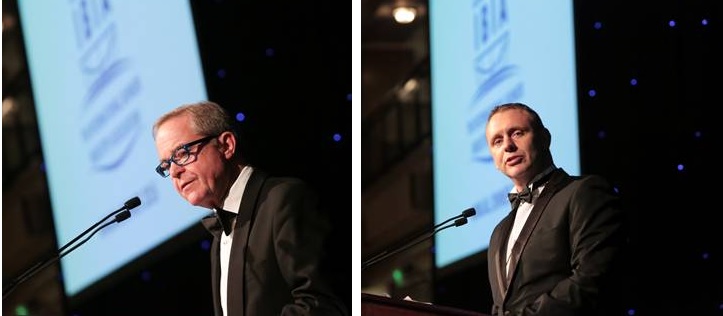IBIA appointed new board members and set priorities for the future. During its 23rd annual dinner, IBIA highlighting that a 0.5% global sulphur cap by 2020 would lead to shortages of compliant fuels.
The International Bunker Industry Association (IBIA) has appointed three new members to its Management Board and one new member to the IBIA in Africa Board. The appointments were announced at the Association’s 23rd annual dinner, which was held on 8 February at the Grosvenor House Hotel, Park Lane, London.
Heralding the beginning of International Petroleum week, the prestigious event attracted a record number of attendees, with over 1100 bunker industry professionals at the dinner, despite the gloomy state of the industry.
Chairman elect Robin Meech, opened the event by acknowledging that the last year has been a period of dramatic change, with global trade slowing, along with global bunker demand.
Mr Meech thanked the outgoing IBIA Chairman Jens Maul Jørgensen, Director of the Bunker Department, Oldendorff Carriers GmbH & Co. KG for his strong leadership and direction over the last two years, a period which has seen a 17 per cent rise in IBIA membership, to the current 760 individual and corporate members from 80 countries.
He then announced the election of three new board members at the association’s recent AGM. Bob Sanguinetti, CEO and Captain of the Port of Gibraltar, Henrik Zederkof, CEO Dan-Bunkering and Mustafa Muhtaroglu, CEO Energy Petrol will all join the IBIA Board on 1 April, 2016.
Mr Meech also welcomed Patrick Holloway, Partner with Webber Wentzel Attorneys, who is an IBIA main board member and steers the IBIA in Africa, Executive Committee. He thanked Dilip Mody, Treasurer on the IBIA board, who stood down at the AGM, recognising his valued support and significant contribution over recent years.
Mr Meech went on to outline some of the association’s key achievements over the last year. IBIA has grown significantly in both membership and influence.
IBIA represents members’ interests at the International Maritime Organisation, sharing both practical considerations and industry perspectives on the introduction of the 0.50% global sulphur cap.
IBIA believes that if it were to be introduced in 2020, there would not be sufficient compliant fuel to meet industry demand. Such a move would lead to extreme price differentials, low levels of compliance with those companies that were compliant, operating at a 25% cost disadvantage to those less scrupulous operators and charterers.
IBIA works closely with other industry organisations including INTERTANKO, INTERCARGO and the International Chamber of Shipping to improve bunker quality while striving to avoid over regulation and poor returns for professional suppliers. The association’s new office in central London is alongside the Society for Gas as a Marine Fuel, strengthening the associations’ influence in the growing LNG bunker market.
IBIA is also pushing to improve bunkering facilities at ports around the world. Peter Hall, IBIA chief executive and members of the IBIA board, met with top executives from six of the world’s larger ports – the Port of Singapore, the Port of Gibraltar, the Port of Rotterdam, the Port of Malta Port, the Port of Algeciras, the Port of Santa Cruz de Tenerife and a representative for West African ports – this week, to discuss closer working and the development common practices as part of IBIA’s global Port Charter. This follows on from the IBIA Forum held in Mauritius in 2015, in conjunction with the government to explore the development of the island nation as a significant bunker hub, an initiative which will be repeated in 2016, in Ghana.
Looking forward, IBIA is keen to support membership growth and to increase engagement, encouraging members to share their collective knowledge by joining one of the associations’ working groups. These groups are key to ensuing that IBIA remains the truly balanced voice of the industry, with the association’s balance and breadth of membership giving it credibility on both a national and international stage.
Finally, Mr Meech announced that carbon emissions, greenhouse gases, and education and raising industry standards would be the key concerns for his forthcoming term of office, as well as the members’ recent industry wide call for higher ethical standards.
Source & Image Credit: IBIA






























































